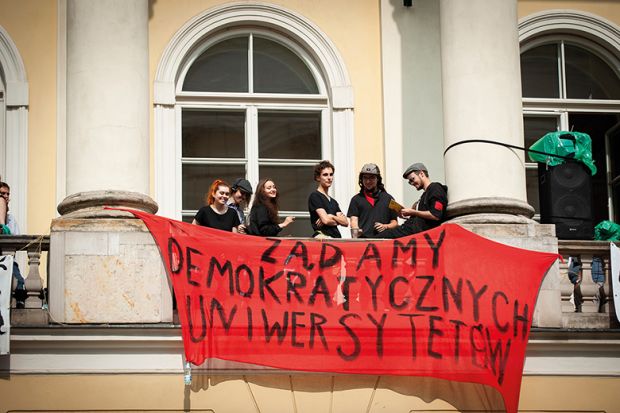Brexiteer parliamentarians take great delight in invoking Winston Churchill. They bat away objections to a disorderly withdrawal from Europe’s great post-war project with misty-eyed references to the endurance shown by the UK during a conflict that was over before they were born. Yet it isn’t hard to argue that the whole of Brexit is exhibit A in Churchill’s famous observation that democracy is the worst form of government except for all those other forms that have been tried.
On the other hand, you could argue that such talk at least provides an albeit complex counterexample to the idea that democracies are unable to agree to make painful sacrifices. That might at least give some hope when it comes to mitigating climate change – 40 years after Jimmy Carter’s calls for the US to use less energy led to a resounding defeat in the 1980 presidential election.
Of course, it is possible that democracy will collapse before biodiversity does. While George W. Bush was happy to channel Woodrow Wilson’s “making the world safe for democracy” philosophy in his invasion of Iraq and Afghanistan, the string of corrupt and sectarian governments that were subsequently elected pointed to the limits of popular wisdom.
Then came Donald Trump, a man whose respect for American democracy is such that he encouraged Russia’s efforts to subvert it and, when he thought he was still going to lose the 2016 presidential election, claimed that it was “rigged” . The fact that there is even a question about whether he will leave office quietly if he loses in 2020 suggests that the world may be less safe for democracy than it has been in many decades.
In universities, many academics also retain their own misty-eyed nostalgia for the collegiate, consensus-based decision-making that prevailed before managerialism and neoliberalism came along to spoil it all.
In that regard, a challenging example is presented by Poland, the subject of our cover feature this week. There, academic deans and rectors continue to be directly elected by academics – a system that survived even 40 years of totalitarian communist government. Yet, whatever else it achieves, such autonomy has not yielded high achievement. Researchers based in Poland have won only four out of 2,899 advanced grants awarded by the European Research Council since 2008, for instance. Underfunding and the legacy of communism undoubtedly play a role here, but most observers appear to agree that there is a problem with Polish universities’ operation on the basis of favours and connections, rather than merit.
Of course, there is a balance to be struck between pressure to perform and academic well-being, and it is easy to argue that many Western universities have gone too far the other way. But, as with climate change, the risk of democracy is that it mitigates against the need to challenge ourselves to try harder.
One consequence of centralising power in universities is that it makes it much easier for governments to impose their own wills – popularly endorsed or otherwise – on academia. This is a particular concern in Poland, whose populist right-wing government is widely suspected of wanting to emulate its counterpart in Hungary and impose its ideology on academia.
Less overtly political forms of oversight and control are also evident in other countries. The UK has the research and teaching excellence frameworks. And Australia has Excellence in Research for Australia and, soon, its own version of the TEF, known simply as “performance funding”.
Detailed proposals for how that might work were released last week by a government-convened panel, led by University of Wollongong vice-chancellor Paul Wellings, and are reported in our pages.
Four selected metrics – first-year attrition, graduate employment, student perceptions of teaching quality and participation by under-represented groups – will be used to allocate extra funds on top of each university’s basic grant. No doubt, the omission of the word “teaching” from its title will avoid some of the acrimony the UK saw around what the metrics really measure. However, questions about their appropriateness and robustness are already emerging.
It will be interesting to see the reaction of the UK’s returning universities minister and father of the TEF, Jo Johnson, to the likely rejection of the viability of a subject-level version by the soon-to-report Pearce review. Will be accept this limit to political oversight. In Australia, meanwhile, there is an intriguing twist to the proposals. According to Wellings, universities with poor outcomes will be able to retain some performance funding in exchange for giving up a certain amount of autonomy to the Education Department in the areas they are deemed to be failing in.
Academics might think that it makes little difference whether they are directed by a distant vice-chancellor or by an even more distant minister. But it seems at least moot whether student outcomes would be better under collegiate democracy. As Churchill also said: “It is no use saying: ‘We are doing our best.’ You have got to succeed in doing what is necessary.”
POSTSCRIPT:
Print headline: Votes for HE democracy?
Register to continue
Why register?
- Registration is free and only takes a moment
- Once registered, you can read 3 articles a month
- Sign up for our newsletter
Subscribe
Or subscribe for unlimited access to:
- Unlimited access to news, views, insights & reviews
- Digital editions
- Digital access to THE’s university and college rankings analysis
Already registered or a current subscriber? Login








